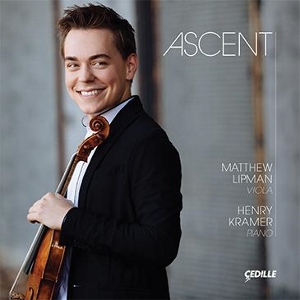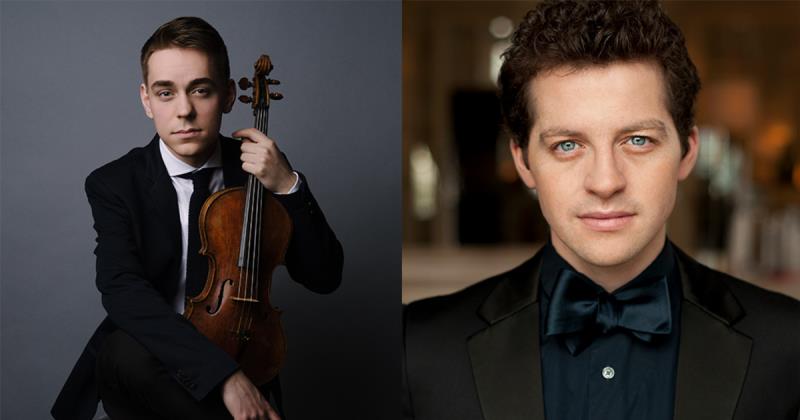AN ACT OF ASCENSION
For years, violas and violists have been the butt of some truly funny jokes:
Q: How do you keep your violin from getting stolen?
A: Put it in a viola case.
Q: What’s the difference between a dead skunk and a crushed viola in the road?
A. Skid marks before the skunk.
Q: Why do so many people take an instant dislike to the viola?
A: It saves time.
Yet I’ve always loved the grounded sound and hearty, autumnal timbre of a viola, so while I love the humor (I’m not the PC type), I don’t understand the origins. I’ve heard that these jokes stem from the fact that there are few viola concertos, but that has to do with the sonority, I think: a violin and cello are better heard over an orchestra. Maybe it has to do with the perceived bulkiness of the instrument. Whatever the genesis, it looks like they’re here to stay (I even found a Wikipedia page for “Viola Jokes”).
But you won’t be laughing at violist Matthew Lipman, although he engendered a huge grin from me because of his latest CD, a truly remarkable collection of premieres and other works for viola and piano. One listen and you’ll have a greater appreciation for this ridiculously maligned instrument.
As with his turn-of-the-century U.K. contemporaries George Butterworth, Samuel Coleridge-Taylor, and Hamish MacCunn, the enormously prolific York Bowen wrote some unabashedly romantic works. His near 15-minute Phantasy in F major Op. 54 for piano and viola (1918) opens this salon-type program. As with this new record, the Phantasy is delightful and jam-packed with sweet surprises. It also has a harmonic structuring and expression that clearly belongs to Bowen. Joined by the remarkably deft pianist Henry Kramer, Lipman’s achingly bittersweet interpretation is transportive. Bowen’s composing for both instruments is truly challenging yet there’s never any indication from either player that it’s anything but effortless, which I know it’s not. The duo, playing together six years after having met as Juilliard undergrads, set us up with an eloquence which permeates the 10-track CD, now out on Çedille (say-DEE), a label based in Lipman’s hometown, Chicago.
Modernistic and reflective, equal parts somber and joyful, Clarice Assad’s Metamorfose gets a world premiere recording here. As far from pretentious as I wish most modern music was, the viola cries, trembles, searches, floats, and takes flight — fitting for this tribute CD to Lipman’s mother, who passed in 2014. Commissioned by Lipman, the two parts, “Crisálidas” and “Dança das Barboletas,” beautifully represent his journey from mourning to release.
 Perhaps the most oft-recorded work here is Robert Schumann’s Märchenbilder (1851). The mid-range sound of a viola lends itself to the melancholic lyricism of Schumann’s late chamber works, and the four-piece set of fairytale pieces with piano was specifically conceived for this instrument. The performances are exquisitely balanced, refined and mindful of the elegiac character that broadly underpins the work.
Perhaps the most oft-recorded work here is Robert Schumann’s Märchenbilder (1851). The mid-range sound of a viola lends itself to the melancholic lyricism of Schumann’s late chamber works, and the four-piece set of fairytale pieces with piano was specifically conceived for this instrument. The performances are exquisitely balanced, refined and mindful of the elegiac character that broadly underpins the work.
Of course the big news here is that we get a world premiere of a Shostakovich Impromptu for Viola and Piano, Op. 33 (1931). Patrick Castillo’s astoundingly accessible and thorough liner notes lets us know that this recently discovered work joins the 1975 Viola Sonata as the composer’s only pieces for viola and piano. Well, it definitely is a masterpiece in miniature, lasting just under two minutes. It’s almost a crash course in Shostakovich’s poly-stylist ways, as he combines many different musical techniques — sharp contrasts; elements of the grotesque; ambivalent tonality — in his inimitable neo-classical style.
The great Franz Waxman (film scores for Sunset Boulevard and Rear Window) wrote his Carmen Fantasie for violin and orchestra, no doubt because of its wealth of attractive themes. Begun as a part of his score to the 1946 movie Humoresque, the Fantasie has been adapted for a number of instruments, including trumpet, and it remains one of the strongest depictions of Bizet’s dramatic opera. Knowing that this is considered among the most difficult pieces ever written for the violin, I was not prepared for such a virtuosic rendering on viola. Not only is it the first time that the viola rendition has been recorded, but it will give anyone else who tries a passionate, eloquent rendering to live up to.
The most stunning work for me is Garth Knox’s Fuga Libre for viola solo (perhaps that’s why Lipman’s face is on the CD cover!). Beginning with Bach-like baroque musical patterns, the music gradually yet ever more quickly moves towards contemporary forms and sounds. This is a startlingly fun showcase, and Lipman bows magnificently with a propulsive force that’s mesmerizing. When the PR materials say that Lipman is “recognized as one of the world’s leading young instrumentalists,” you will assent.
https://www.facebook.com/melodiousmatt/videos/2331377770413253/
Ascent
Matthew Lipman, viola; Henry Kramer, piano
Çedille Records | 10 tracks | 64:37 | released on February 8, 2019
available at Amazon, iTunes, and Çedille



